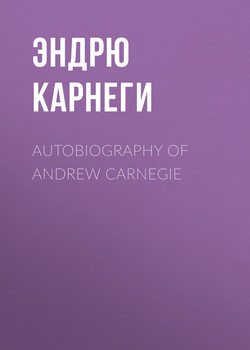Читать книгу Autobiography of Andrew Carnegie - Эндрю Карнеги - Страница 2
EDITOR'S NOTE
ОглавлениеTHE story of a man's life, especially when it is told by the man himself, should not be interrupted by the hecklings of an editor. He should be allowed to tell the tale in his own way, and enthusiasm, even extravagance in recitation should be received as a part of the story. The quality of the man may underlie exuberance of spirit, as truth may be found in apparent exaggeration. Therefore, in preparing these chapters for publication the editor has done little more than arrange the material chronologically and sequentially so that the narrative might run on unbrokenly to the end. Some footnotes by way of explanation, some illustrations that offer sight-help to the text, have been added; but the narrative is the thing.
This is neither the time nor the place to characterize or eulogize the maker of "this strange eventful history," but perhaps it is worth while to recognize that the history really was eventful. And strange. Nothing stranger ever came out of the Arabian Nights than the story of this poor Scotch boy who came to America and step by step, through many trials and triumphs, became the great steel master, built up a colossal industry, amassed an enormous fortune, and then deliberately and systematically gave away the whole of it for the enlightenment and betterment of mankind. Not only that. He established a gospel of wealth that can be neither ignored nor forgotten, and set a pace in distribution that succeeding millionaires have followed as a precedent. In the course of his career he became a nation-builder, a leader in thought, a writer, a speaker, the friend of workmen, schoolmen, and statesmen, the associate of both the lowly and the lofty. But these were merely interesting happenings in his life as compared with his great inspirations—his distribution of wealth, his passion for world peace, and his love for mankind.
Perhaps we are too near this history to see it in proper proportions, but in the time to come it should gain in perspective and in interest. The generations hereafter may realize the wonder of it more fully than we of to-day. Happily it is preserved to us, and that, too, in Mr. Carnegie's own words and in his own buoyant style. It is a very memorable record—a record perhaps the like of which we shall not look upon again.
John C. Van Dyke
New York
August, 1920
